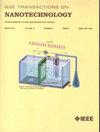基于在线探针旋转和自适应速度策略的3D-AFM智能扫描过程
IF 2.1
4区 工程技术
Q3 ENGINEERING, ELECTRICAL & ELECTRONIC
引用次数: 0
摘要
原子力显微镜(AFM)一直是研究微观世界最重要的形态学工具之一。然而,3D-AFM有几个缺点。首先,物理AFM尖端占用空间,有时可能会阻碍扫描过程,造成扭曲的结果,特别是垂直侧壁。此外,传统的AFM扫描方案导致沿陡峭表面的数据密度更稀疏。在这项工作中,为了减轻畸变,AFM探针被允许旋转。此外,扫描线上沿快轴的扫描速度必须根据地形变化自适应。因此,我们的目标是在提出的探针旋转决策(PRD)和自适应速度决策(ASD)模块的辅助下开发和实现智能AFM扫描过程,使AFM探针能够实现在线旋转和可变扫描速度。此外,还提出了在线粗补偿和离线精细补偿的方法,以精确消除探针旋转引起的尖端偏移。最后,将提供一些比较结果来证明所提出的智能扫描过程的有效性。本文章由计算机程序翻译,如有差异,请以英文原文为准。
An Intelligent 3D-AFM Scanning Process Based on Online Probe Rotation and Adaptive Speed Strategy
Atomic Force Microscope (AFM) has remained one of the most prominent morphology tools for examining the microscopic world. However, the 3D-AFM has several disadvantages. First, the physical AFM tip occupies space and may sometimes obstruct the scanning process, creating distorted results, especially for vertical sidewalls. Additionally, the traditional AFM scanning scheme results in sparser data density along steep surfaces. In this work, to alleviate distortion, the AFM probe is allowed to rotate. Moreover, the scanning speed along the fast axis in a scan line has to be adaptive according to terrain variation. Therefore, we aim to develop and implement an intelligent AFM scanning process assisted by the proposed probe rotation decision (PRD) and adaptive speed decision (ASD) modules, enabling the AFM probe to achieve online rotation and variable scan speed. Moreover, methods for online coarse compensation and offline fine compensation are also presented to accurately eliminate tip shifts caused by probe rotation. Finally, some comparison results will be provided to demonstrate the effectiveness of the proposed intelligent scanning process.
求助全文
通过发布文献求助,成功后即可免费获取论文全文。
去求助
来源期刊

IEEE Transactions on Nanotechnology
工程技术-材料科学:综合
CiteScore
4.80
自引率
8.30%
发文量
74
审稿时长
8.3 months
期刊介绍:
The IEEE Transactions on Nanotechnology is devoted to the publication of manuscripts of archival value in the general area of nanotechnology, which is rapidly emerging as one of the fastest growing and most promising new technological developments for the next generation and beyond.
 求助内容:
求助内容: 应助结果提醒方式:
应助结果提醒方式:


